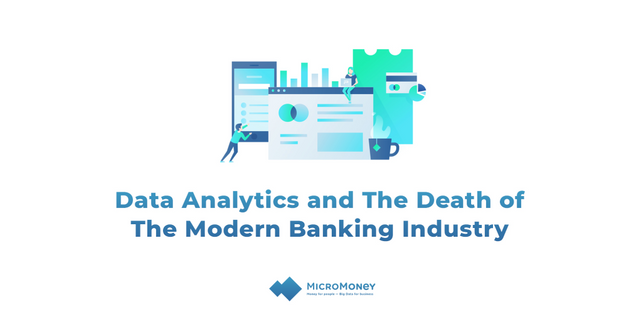Anton Dziatkovskii, Founder of MicroMoney talks about how the focussed use of Big Data may help banks extend their reach without increasing their physical infrastructure.

It’s difficult to imagine a world without banks. The traditional banking system has become so pervasive in our lives that we cannot think of a world where trade, business and even daily transactions can occur without a bank. While we may think of this scenario as improbable, we are actually part of a generation that is slowly moving away from banks.
Non-traditional players looking to become primary financial service providers
Imagine your transactions with Amazon, for instance. You fill in your AmazonPay wallet and pay for goods and services through it. If you are a Prime member, you get 2% cashback on all your purchases. You can pre-order experiences and goods before launch. You can basically do all this and more using your Amazon app, rather than your card or cash. Doesn’t it seem more like a bank account? If you are a merchant with a digital storefront, you can also add a button to your website that allows your customers to pay with their Amazon balance and checkout using their Amazon account information. Where, in all of this, is the bank?
What is helping them? Big Data
There are other non-financial players that are looking to take you away from traditional banking, and with good reason. They started off either as an e-commerce store or a payment gateway solution, but as more and more people got attracted towards the unique experiences that these platforms provided, these platforms also started receiving a ton of data from their customers’ online behavior. This data — big data, as it is called — can be used extremely strategically to create unique and highly customized experiences for customers. And these players know how to leverage this personal data of customers to keep them loyal.
‘Experience providers’ as I would call them, like Amazon, are gradually but surely encroaching upon the hallowed turf of banks. And they are doing this with the help of big data analytics. If traditional institutions do not leverage their customers’ data better, outside players will soon become primary providers of financial services.
The traditional banking system has been slow to embrace technological advancements. While there have been innovations in fintech, banks are often the slowest to accept them because they have been foolishly secure in the idea of their infallibility. Players like Amazon have proven that banking institutions are not indispensable and the onus is now on banks to fight for their turf against powerful contenders.
2 Billion Unbanked People in the World — An Opportunity?
Let me paint a different picture for you. Traditional banking has still not reached over 2 billion people in the world. That is roughly 25% of the global population, or one in every four people in the world. Most of these people live in the poor and developing nations of Africa and Asia. These people have always had a bitter-sweet relationship with banks. More bitter than sweet, I’d say. These people are not part of the global economy and do not have access to basic financial services. They still use cash for their daily transactions and cannot get loans from banks because of an absent credit history.
On the other hand, these are the same people who have access to mobile phones and thus, the internet. A case in point — while 80% of adults in Africa have no access to basic banking, 63% use mobile phones and while, on an average, only 27% people in South-East Asia have access to banks, it is the world’s fastest growing internet region. So what does all of this mean? It means that digital players like Facebook and Amazon have better access to this unbanked and un(der)served population than the banks. It means that whoever gets access to these unbanked peoples’ data can design products and services for them.
MicroMoney — Aggregator of Big Data from the Unbanked Global Population
At MicroMoney, we realized the importance of big data pretty early. What started as a micro-finance company has blossomed into a de-centralized open source credit and big data bureau on the blockchain. We started out with a mission to help the unbanked population of the world in the poorest countries get into the financial mainstream by offering them loans and helping them build a robust credit history. As we expanded our footprint and started offering more loans to more and more people, we created an app that gathers 10,000 parameters. We then analyze this big data using our proprietary AI Neural Network Scoring that helps us approve loans in 15 seconds flat. This led us to create an open source credit bureau on the blockchain.
We provide big data of previously unserved customers. We are the bridge between these people who need services, and businesses who need new customers. This data can also help banks connect with these new customers who now have a credit history that will enable them to take bigger loans from banks to bring their dreams and aspirations into reality.
The battle ahead
As discussed, we have data. It is now the prerogative of either outside players like, say Amazon, or traditional bank to use this data to connect better with customers. We’ve already seen how platforms like Amazon are attacking banks where it hurts the most — by attracting customers away from banks. Banks need to gear up for the battle of the century as they try to snatch their turf back and keep customers loyal to them. Which side leverages big data better is going to be the clear winner. But in this battle the ultimate winner is always going to be the end user — the customer, the attention of whom these players are fighting. If non-traditional players win, we may actually witness a “bankless era.” It will be interesting to watch from the sidelines as two Goliaths battle it out for the ultimate prize.